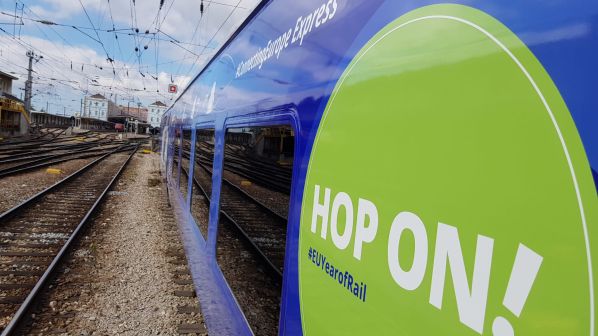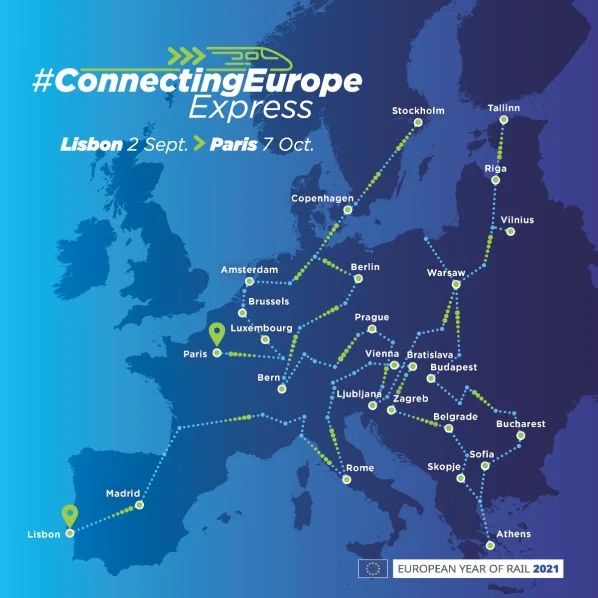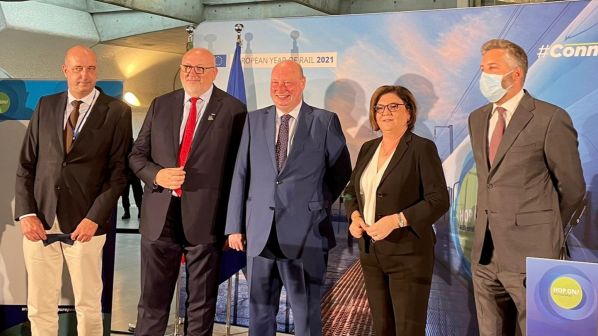THE Connecting Europe Express, a special train put together as part of the European Year of Rail, has departed Lisbon ahead of a five-week, 20,000km journey through more than 100 towns and cities in 26 countries before arriving in Paris on October 7.
“Rail has shaped our rich, common history,” says European commissioner for transport, Ms Adina Vălean. “But rail is also Europe’s future, our route to mitigating climate change and powering economic recovery from the pandemic, as we build a carbon-neutral transport sector. Over the coming weeks, the Connecting Europe Express will become a rolling conference, laboratory and forum for public debate on how to make rail the transport mode of choice for passengers and businesses alike.”
Due to the different gauges in Europe, the Connecting Europe Express will comprise three trains - the Iberian train, the Standard train and the Baltic train - that will meet along the route.

The coaches for the train have been provided by different European operators. Hungarian State Railways (MAV) has supplied a coach that will host a mobile exhibition organised by the European Climate, Infrastructure and Environment Executive Agency (Cinea) and the Shift2Rail Joint Undertaking, which will showcase the many existing technologies and innovations improving the rail experience and show how the EU supports infrastructure projects.
A conference coach provided by French National Railways (SNCF), two standard seating coaches provided by German Rail (DB) and Swiss Federal Railways (SBB), a dining car from Italian State Railways (FS) and a sleeping car from Austrian Federal Railways (ÖBB) will complete the Standard train. The 1668mm-gauge Iberian train travelling through Portugal and Spain has been provided by Spanish operator Renfe, while Lithuanian Railways (LTG) is operating the 1520mm-gauge Baltic train.

The Connecting Europe Express is the result of unique cooperation between the European Commission and the Community of European Railway and Infrastructure Companies (CER), operators, infrastructure managers and numerous other partners at European Union (EU) and local level. Along the route, various events are planned to welcome the train at stations across Europe. People can also follow debates happening on board as well as conferences on EU infrastructure policy and the role of the Trans-European Transport Network (TEN-T), that will be live streamed via the event website from Lisbon, Bucharest, Berlin and Bettembourg.
CER will also welcome the train in Gdansk, Poland, where rail CEOs will gather for the CER annual general assembly hosted by Polish State Railways (PKP). Members of the European Parliament and representatives of Erasmus by Rail have also been invited to join an event in Strasbourg during plenary week, organised in collaboration with SNCF, which will focus on the topics of youth, rail and sustainability.
“The Connecting Europe Express is impressive proof of the success of the European Year of Rail, at the same time it points out our joint challenges ahead,” says CER chair and ÖBB CEO, Mr Andreas Matthä. “CER members are committed to make the green deal a success. A strong European railway sector is vital for achieving the EU climate targets. Currently there are too many technical barriers in cross-border rail transport and it is very complex to run a train across national borders in Europe. We need to continue to shift freight from road to rail, provide efficient services for daily commuters and expand international long-distance passenger rail transport with day and night services. I am convinced that the Connecting Europe Express will raise awareness of these challenges.”

